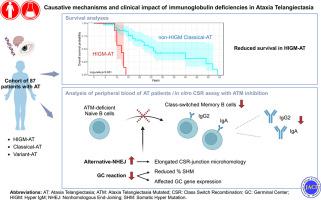Journal of Allergy and Clinical Immunology ( IF 11.4 ) Pub Date : 2024-01-26 , DOI: 10.1016/j.jaci.2023.12.029 Sanami Takada 1 , Thomas J Weitering 1 , Nienke J H van Os 2 , Likun Du 3 , Ingrid Pico-Knijnenburg 1 , Thomas B Kuipers 4 , Hailiang Mei 4 , Elisabeth Salzer 1 , Michèl A A P Willemsen 5 , Corry M R Weemaes 6 , Qiang Pan-Hammarstrom 7 , Mirjam van der Burg 1

|
Background
Ataxia Telangiectasia (AT) is characterized by cerebellar ataxia, telangiectasia, immunodeficiency, and increased cancer susceptibility, caused by mutations in the ataxia telangiectasia mutated (ATM) gene. The immunodeficiency comprises predominantly immunoglobulin (Ig)-deficiency, mainly IgA and IgG2, with a variable severity. So far, the exact mechanisms underlying the Ig-deficiency, especially the variable severity, remain unelucidated.
Objective
To characterize the clinical impact of Ig-deficiencies in AT and to elucidate the mechanisms of Ig-deficiencies in AT.
Methods
We analyzed long-term Ig-levels, immunophenotyping, and survival time in our cohort (n=87, median age 16 years; maximum 64 years). Somatic hypermutation (SHM) and class-switch junctions in B-cells were analyzed by next-generation sequencing. Furthermore, an in vitro class-switching induction assay was performed followed by RNAseq, to assess the effect of ATM-inhibition.
Results
Only the hyper-IgM AT phenotype significantly worsened survival time, while IgA or IgG2-deficiencies did not. The Ig-levels showed predominantly decreased IgG2 and IgA. Moreover, flowcytometric analysis demonstrated reduced naïve B- and T-lymphocytes and a deficiency of class-switched IgG2 and IgA memory B-cells. SHM frequencies were lowered in IgA and IgG2-deficient patients, indicating a hampered germinal center (GC) reaction. In addition, the microhomology of switch junctions was elongated, suggesting alternative end-joining during class-switch DNA-repair. The in vitro class-switching and proliferation were negatively affected by ATM-inhibition. RNA-sequencing analysis showed that ATM-inhibitor influenced expression of GC reaction genes.
Conclusion
Ig-deficiency in AT is caused by disturbed development of class-switched memory B-cells. This study suggests that ATM-deficiency affects both the GC reaction and the choice of DNA-repair pathways in class-switching.
中文翻译:

共济失调毛细血管扩张症免疫球蛋白缺乏的病因机制和临床影响
背景
共济失调毛细血管扩张症 (AT) 的特点是小脑性共济失调、毛细血管扩张、免疫缺陷和癌症易感性增加,由共济失调毛细血管扩张突变( ATM ) 基因突变引起。免疫缺陷主要包括免疫球蛋白(Ig)缺乏,主要是 IgA 和 IgG2,其严重程度各不相同。到目前为止,Ig 缺乏的确切机制,尤其是不同的严重程度,仍不清楚。
客观的
描述 AT 中 Ig 缺乏的临床影响并阐明 AT 中 Ig 缺乏的机制。
方法
我们分析了队列中的长期 Ig 水平、免疫表型和生存时间(n=87,中位年龄 16 岁;最长 64 岁)。通过新一代测序分析 B 细胞中的体细胞超突变 (SHM) 和类别转换连接。此外,在 RNAseq 后进行了体外类别转换诱导测定,以评估 ATM 抑制的效果。
结果
只有高 IgM AT 表型会显着缩短生存时间,而 IgA 或 IgG2 缺陷则不会。 Ig 水平主要显示 IgG2 和 IgA 下降。此外,流式细胞术分析表明,幼稚 B 淋巴细胞和 T 淋巴细胞减少,并且类别转换 IgG2 和 IgA 记忆 B 细胞缺乏。 IgA 和 IgG2 缺陷患者的 SHM 频率降低,表明生发中心 (GC) 反应受到阻碍。此外,转换连接的微同源性被延长,表明在类别转换 DNA 修复过程中存在替代末端连接。 ATM 抑制对体外类别转换和增殖产生负面影响。 RNA测序分析表明ATM抑制剂影响GC反应基因的表达。
结论
AT 中的 Ig 缺乏是由类别转换记忆 B 细胞发育紊乱引起的。这项研究表明,ATM 缺陷会影响 GC 反应和类别转换中 DNA 修复途径的选择。































 京公网安备 11010802027423号
京公网安备 11010802027423号